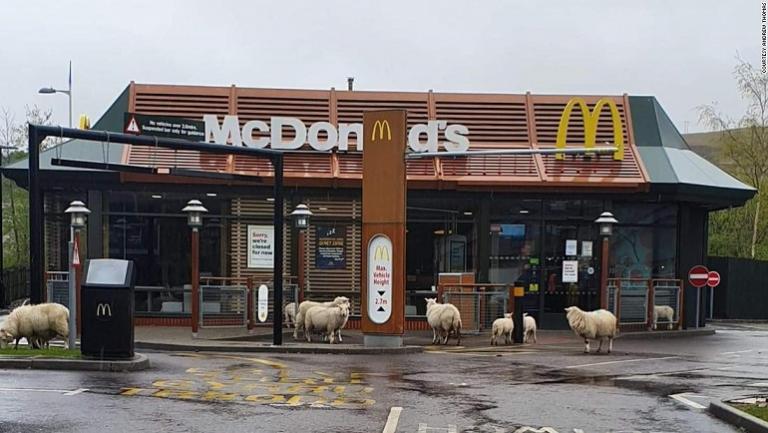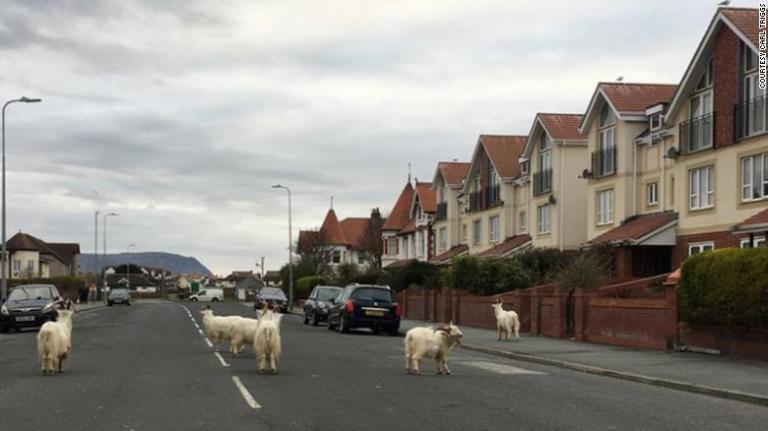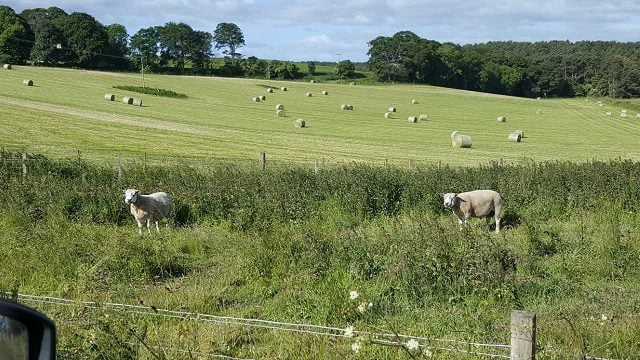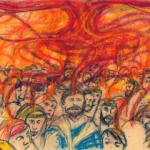As horrific and tragic as most Covid-19 stories are, every once in a while these days I come across a story that both makes me smile and gives me hope. These stories have a common theme–while the fragility of human lives and interests are on daily display world-wide, it appears that non-human nature is benefitting from, even kind of enjoying, the brave new world that the coronavirus has thrust upon us. For instance, a new species of clientele is showing up at tne McDonald’s in Ebbw Vale, Wales, as sheep found some grass worth eating outside the front door.

And then there’s the gang of wild goats who have apparently occupied the streets of the Welsh coastal town of Llandudno, roaming freely through the village, eating flowers and peering into the windows at human beings sheltered in their homes. (Note to self: Jeanne and I really need to follow through on our plans to visit Wales when we can travel again. It sounds like a very cool place.)

Over the past couple of years, as I have raved to everyone who would listen about how fabulous our summer 2018 Scotland vacation was, sheep have always been part of the conversation. I estimate, conservatively, that Jeanne and I saw about seven billion sheep in our ten days there. They were everywhere, including across the road from two of the B and B’s we stayed in, as well as along the side of (and sometimes in the middle of) virtually every road that we drove on the wrong side of.

Interestingly, I don’t recall that we ever saw a shepherd. We experienced all sorts of weather, as one might expect in Scotland, and saw sheep in the middle of all of them. When I asked someone (probably in a bar) about this, she seemed surprised by the idea that sheep might need constant shepherding. Most of the sheep Jeanne and I saw had a mark for identification purposes—these “brands” looked as if they had been spray painted on the unfortunate animal. Finally, sheep in Scotland are clearly for wool growing, not eating. I don’t recall seeing mutton or lamb chops on the menu at any of the restaurants we visited.
Today is “Good Shepherd Sunday” with sheep/shepherd readings throughout. Psalm 23 tells us that the Lord our shepherd leads us in paths of righteousness and even is with us in our darkest hours, as we walk through the valley of the shadow of death; the Gospels tell us that “the Good Shepherd gives his life for his sheep,” and one of Matthew’s parables is about a tender-hearted shepherd who leaves ninety-nine sheep safely penned up in order to find a lost one so he can restore his flock to an even hundred.
Shepherds and sheep evoke a pastoral and peaceful image, but very few of us have any knowledge of what the daily lives of shepherds and sheep are like. As Jeanne and I traveled through Scotland trying to avoid falling over the ever-present sheep, I was occasionally reminded of another sheep-related outing from thirty years ago while we were living in Milwaukeee.
Milwaukee is a city of festivals, with every ethnic group imaginable getting its own weekend and festival. During a celebration of all things Scottish, Jeanne and I were with the boys at one of the many large parks that Milwaukee has to offer for Scottish Fest. The weather was appropriate, drizzly and foggy with bone-chilling dampness.
One of the events that day was a demonstration of sheep herding. Upon being let out of the penned enclosure in which they were being held, a flock of forty or fifty sheep immediately scattered to the four winds, running into the surrounding residential neighborhood faster than I ever imagined sheep could move their fat, wool-laden selves. The shepherd remained standing in the now-sheepless park, with two small border collies at his side, as residents of the surrounding streets wondered where the hell the sheep in their back yards came from.
Then at a signal from the shepherd, the border collies leaped into action. After they disappeared into the neighborhood like lightning bolts, we could hear the dogs occasionally barking in the distance. Within a few minutes, sheep started appearing from various directions, with the border collies running manically back and forth behind them, nipping at their heels and talking trash as only a dog can. Before long, all of the sheep were back in the pen and the border collies returned to the shepherd’s side. He bowed in acknowledgement of our applause, even though his four-legged buddies had done all of the work.
As a youngster, I always bristled at the frequent Biblical comparison of human beings to sheep, because I knew (or had read at least) that sheep were both smelly and stupid. Although artists’ renditions of Jesus with sheep are always lovely and peaceful, it is not a compliment when a group of people are referred to as a “flock” or as a bunch of sheep. Sheep are mindless followers with little independent thought, at least according to the great movie “Babe” from years ago. I still resist the analogy (according to my youngest son, who was a vet tech for several years, goats–as well as just about every animal—are much more interesting and smarter than sheep), and would prefer to be compared to just about any other animal than a sheep.
But Jeanne and I learned a few additional things about sheep in Scotland that summer, things worth keeping in mind if we want the God-as-shepherd-and-we-as-sheep metaphor to be accurate. Sheep are tough and resilient. A shepherd can stick his or her sheep out in a pasture with sufficient grass, mark them as his or her own, then walk away—apparently for days or weeks at a time. Sheep don’t need constant pampering and attention. They are naturally equipped to survive all sorts of weather, all the time slowly but surely growing the wool that is, after all, the primary purpose of their existence.
If God is the shepherd and we are the sheep, we can expect to be left alone and to have to rely on our own devices for long stretches of time. But the slow work of growth and productivity continues reliably whether the divine shepherd is in the pasture or not. As the sheep of God’s flock, we are naturally designed to be useful and productive in all sorts of ways, no matter what the circumstances are, and regardless of whether it seems as if nothing is happening and that the shepherd has left for good. The shepherd knows that we are tougher than we think we are, and that we are a lot more valuable than we might appear. And when the storms come, as they always will, the shepherd knows that we can handle that as well. And that’s okay, because just like my Scottish hat, purchased in the Scottish port town of Oban, made from the wool of Scottish sheep, sheep are laregly waterproof.













